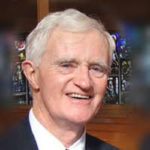Power is still the Church’s stumbling block. Mind you, Jesus warned us: The gentiles lord it over their subjects – not so with you. The Church’s power to “lord it over” society has been curtailed by today’s pluralism but is still jealously guarded within the institution. And ideas and laws are the instruments by which power is exercised. Doctrine and law are sacralised as the teaching of the Church – or even the teaching of God.
Before they were known as Christians they were Followers of The Way. Now, after fifteen centuries, the Church is trying to return to walking that way again.
There are two definitions of faith:
- commitment to someone or something; believing in; the heartdominates.
- accepting an idea as true; believing that; the headdominates.
The early followers of The Way believed in Jesus and his way of living. Over time ideas crystallized. They came to believe that Jesus was a prophet, the messiah, the saviour, the Son of God, the Word that was with God from the very beginning. The commitment came first. Ideas followed as they articulated what that commitment entailed. Cultures change bringing new realities calling for new applications of the way to live. Theology, precisely because it attempts to articulate that changing reality, is always a work in progress.
2nd and 3rd century culture was swirling with ideas and this had an impact on the life of a fast-growing Christian movement. They adopted a Stoic approach to sex. The Desert Fathers evidenced a fascination with asceticism The Fathers of the Church – leaders of the movement in Rome, Asia Minor, Northern Egypt and North Africa – developed a fascination for theological debate. Constantinople became the new Rome and the Christian Church was catapulted from being a suspect sect to being the spiritual wing of an empire.
By the end of the 4th century Christianity had moved to being heavily doctrinaire rather than existential. Theology was king. The Way had become secondary. Gradually even the way of living became codified in the form of law and regulation. Logos replaced mythos as Karen Armstrong has pointed out.
A member of the Jesus Movement of the 1st century would have found it hard to recognise the institutional Christianity of the end of the 5th century.
Ideas and laws have been front and centre to Christianity ever since. Christendom was born under Constantine and reigned supreme till the 20th century. The Great Schism in the 11th century and the Reformation in the16th century left it fractured but still powerful. It was the 18th and 19th century democracy movements which saw the loss of the Church’s political power with the rise of secular states. Christianity became just one faction in competition with others.
Power is still the Church’s stumbling block. Mind you, Jesus warned us: The gentiles lord it over their subjects – not so with you. The Church’s power to “lord it over” society has been curtailed by today’s pluralism but is still jealously guarded within the institution. And ideas and laws are the instruments by which power is exercised. Doctrine and law are sacralised as the teaching of the Church – or even the teaching of God.
Then along comes a pope who says “Who am I to judge?” He has a dictum: reality is more important than the idea. Ideas, ideology, doctrine, law must be evaluated in the context of the wider life of the community. For the theologian and the legislator ideas determine and control reality. For the pastor a changing reality calls for constant adaptation of our ideas and rules.
This reversal of priorities coincides with a new-found self-confidence in the people. The People of God have their own mind and heart on matters of faith and morals. Pope Francis sees the faith of the people as the most basic source – and more important than the idea. Past articulations may have reflected the faith of the time. But times change, language changes, circumstances change, culture changes. It follows that the following of Jesus’ Way will change in the new cultural context.
A new articulation of the new way will differ from the old in its priorities and procedures. It will use new concepts and images expressed in different literary forms. As the early Church grew, the cultural imagination changed. The allegorical and rhetorical style of the Fathers differed from that of the evangelists. With the advent of Christendom doctrinal formulations and laws replaced the discussion and parables of Jesus and the Fathers. Now the secular culture of the modern world calls for a further re-articulation.
A yearning for the “good, old days” is natural; especially if you believe that the community was stronger then. But reality is relentless. Matthew knew that the scribe trained for the Kingdom of Heaven brought new and old out of his treasure chest. Pope Francis is a realist with a romantic imagination. He is re-visiting ideas and rules which have been canonised as if they are God-given. But, much more important, he has already reversed the predominance given to doctrine ever since the 5th century with a pragmatic way of following Jesus’ Way. We are heading back to our beginnings. That’s real conservatism.
Eric Hodgens is a retired Catholic priest from Melbourne.




